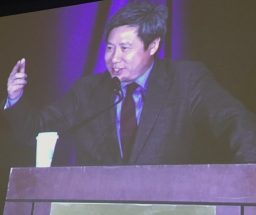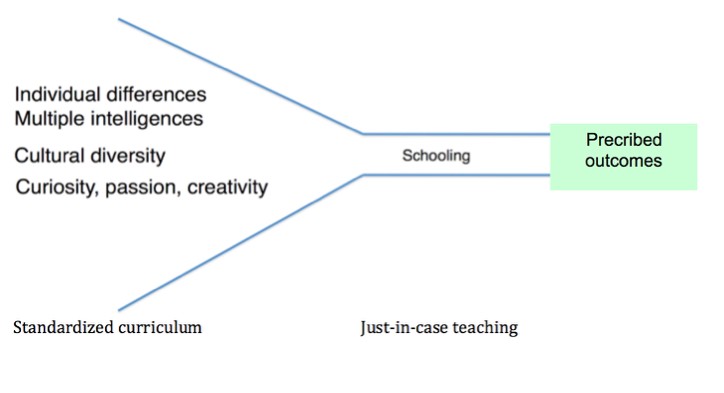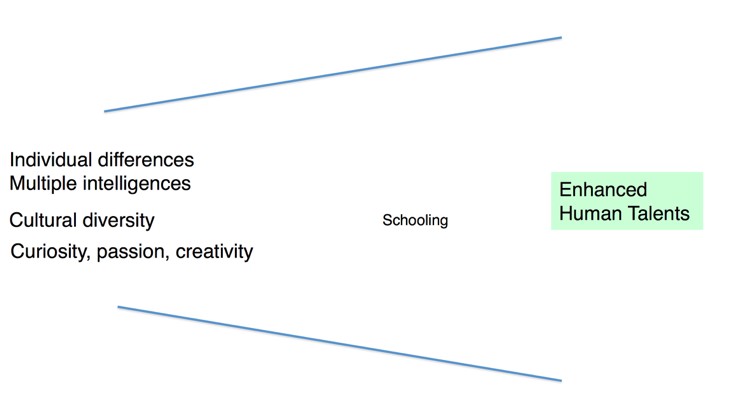Yong Zhao, de l’université de l’Oregon, a prononcé une conférence inspirante et teintée d’humour à propos du décrochage scolaire, des élèves à besoin particuliers et du curriculum scolaire actuel lors du dernier sommet uLead. Voici un résumé de ses propos.
La conférence de fermeture du sommet uLead, qui s’est tenu à Banff du 24 au 27 avril 2016, était offerte par Yong Zhao, président et directeur de l’Institute for Global and Online Education du College of Education de l’université de l’Oregon. C’est avec humour et tact qu’il a utilisé des exemples allant du Petit renne au nez rouge aux stars comme Lady Gaga pour aborder les sujets du décrochage scolaire, des élèves à besoin particuliers et du curriculum scolaire actuel. Voici un aperçu de ses propos.

Tout au long de sa présentation, il a comparé le système d’éducation actuel à une machine pour confectionner des saucisses. Des saucisses standardisées et appréciées des consommateurs : la « chair » utilisée étant tout le potentiel et la couleur unique d’un enfant et la saucisse finale, ayant la même forme, le même goût et les mêmes caractéristiques, peu importe l’individu de départ. Cette saucisse finale prenant le rôle du résultat obtenu suite à ce processus sur un adulte ayant passé à travers ses études. Il insiste sur le fait que tous naissent avec la possibilité de devenir exceptionnels, dotés de talents naturels et de caractéristiques et d’intérêts qui leur sont propres. Selon lui, le curriculum actuel amène les élèves à aborder des contenus et à développer un ensemble de compétences qui « pourraient être utiles » plutôt que de se concentrer sur les compétences essentielles et offrir à l’élève l’opportunité de développer son plein potentiel en exploitant SES différences, ses passions.
 Extrait de : Fixing the Past or Inventing the Future: education reforms that matter, Yong Zhao, uLead 2016.
Extrait de : Fixing the Past or Inventing the Future: education reforms that matter, Yong Zhao, uLead 2016.
Les compétences sur lesquelles repose le succès de notre ère sont, toujours selon lui :
- la capacité à détecter les problèmes à résoudre;
- l’habileté à utiliser sa créativité et son essence personnelle pour bien les résoudre;
- l’aptitude à inventer le futur.
En revenant sur le style d’évaluation que nous privilégions actuellement, il met en évidence la problématique suivante : on évalue l’aisance d’un élève à réussir un examen plutôt que la démonstration de sa compétence à cerner et résoudre une problématique réellement engageante. On l’a préparé en lui fournissant une gamme d’outils à utiliser « au cas où » plutôt que le placer en situation réelle à faire évoluer, voire à réinventer grâce à sa créativité, sa curiosité, ses passions.
Il questionne : l’âge de pierre ne s’est pas terminé parce qu’on a manqué de pierre. Pour améliorer l’éducation, un paradigme doit mourir, dit-il. Attendons-nous la fin de l’ère du pétrole pour agir? Le 4e âge est à nos portes, celui de l’intelligence artificielle. Préparons-nous adéquatement notre relève?
Do we want to fix students deficits to make them mediocres, or allow them to be exceptional?
Pour contrer la « machine à saucisses », il estime que l’enseignant se doit de varier ses approches et de mettre en évidence le talent et les atouts de chaque élève. Il devient une étincelle pour cet être exceptionnel en devenir. L’école doit s’adapter aux enfants et non le contraire. On note un désengagement de plusieurs élèves et on se permet de les en blâmer! Il est de notre ressort de les former pour le monde d’aujourd’hui et non pour celui duquel nous sommes issus. Voilà la raison pour laquelle ils doivent être notre centre d’intérêt et que nous devons adapter nos formules pour qu’elles soient plus représentatives de la société actuelle et des défis qu’ils auront à relever. Ainsi, l’implication et la motivation seront au rendez-vous et on assistera à la naissance d’un nouveau paradigme en éducation, à une valorisation de l’éducation.
 Extrait de : Fixing the Past or Inventing the Future: education reforms that matter, Yong Zhao, uLead 2016.
Extrait de : Fixing the Past or Inventing the Future: education reforms that matter, Yong Zhao, uLead 2016.
[bctt tweet=”«Do we want to fix students deficits to make them mediocres, or allow them to be exceptional?»” username=”ecolebranchee”]






